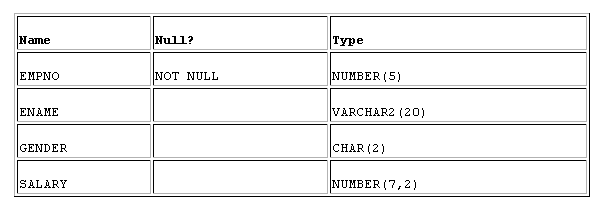Constraints are like rules in relation so that you cannot violate them. There are plenty of constraint types that we use. In this article, we will add a check constraint and delete it from a relation.
The general process to add or remove a constraint from a Relation is as follows.
STEP 1:
In this step, you create EMPLOYEE relation and put a check constraint on Gender.
CREATE TABLE EMPLOYEE (EMPNO NUMBER(5) PRIMARY KEY, ENAME VARCHAR2(20), GENDER CHAR(2), SALARY NUMBER(7,2));
STEP 2:
Here we add the constraint to the table .
ALTER TABLE EMPLOYEE ADD CONSTRAINT CHK CHECK (GENDER IN( 'M','F'));
STEP 3:
Now, you are going to delete the constraint, but before you drop the constraint, let us show you, how to get the constraint name first.
It is a necessary step if you are not the DBA who created the constraint on the relationship and you cannot delete the constraint unless you have appropriate permission.
SELECT CONSTRAINT_NAME FROM USER_CONSTRAINTS WHERE TABLE_NAME = 'you table name';In the above command, you only need to change the “Your Table Name’ with a table name that exists. In this example, EMPLOYEES.

STEP4:
Now that I have the name of the constraint , We can delete the constraint using following command.
ALTER TABLE EMPLOYEE DROP CONSTRAINT CHK;
Summary
Following the above four steps can help you to identify and remove the constraints set on your database tables. Note that these commands are performed on Oracle 10g, therefore, you must be careful while running the same on other database systems. The command and procedure may be different.